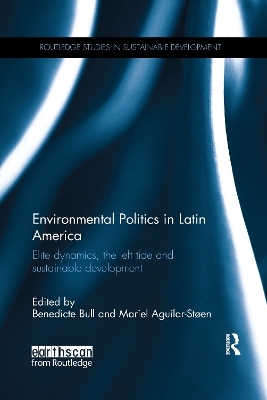
Environmental Politics in Latin America
Routledge (Verlag)
978-1-138-21245-9 (ISBN)
Based on case-studies in eight Latin American countries (Argentina, Brazil, Chile, Ecuador, Colombia, Bolivia, El Salvador and Guatemala), this book investigates the extent to which there have been elite shifts, how new governments have related to old elites, and how that has impacted on environmental governance and the management of natural resources. It examines the rise of new cadres of technocrats and the old economic and political elites’ struggle to remain influential. The book also discusses the challenges faced in trying to overcome structural inequalities to ensure a more sustainable and equitable governance of natural resources.
This timely book will be of great interest to researchers and masters students in development studies, environmental management and governance, geography, political science and Latin American area studies.
Benedicte Bull is a Professor at the Centre for Development and the Environment, University of Oslo, Norway. Mariel Aguilar-Støen is a Senior Researcher at the Centre for Development and the Environment, University of Oslo, Norway.
1. Environmental governance and sustainable development in Latin America 2. Elites, classes and environmental governance: Conceptual and theoretical challenges Part 1: Agriculture and biotechnology 3. El Salvador: The challenge to entrenched elites and the difficult road to a sustainable development model 4. Bolivia: Emerging and traditional elites and the governance of the soy sector 5. Argentina: Government-agribusiness elite dynamics and its consequences for environmental governance 6. Ecuador: Changing biosafety frames and new political forces in Correa's governmenet Part 2: Mining 7. New elites around South America's strategic resources 8. Staying the same: Transnational elites, mining and environmental governance in Guatemala 9. Elite views on the use of water and energy in mining in Argentina, Chile, Colombia and Ecuador Part 3: Forestry 10. REDD+ and forest governance in Latin America: The role of science-policy networks 11. State governments and forest policy: A new elite in the Brazilian Amazon? 12. Conclusion
| Erscheinungsdatum | 21.12.2016 |
|---|---|
| Reihe/Serie | Routledge Studies in Sustainable Development |
| Verlagsort | London |
| Sprache | englisch |
| Maße | 156 x 234 mm |
| Gewicht | 380 g |
| Themenwelt | Naturwissenschaften ► Biologie ► Ökologie / Naturschutz |
| Naturwissenschaften ► Geowissenschaften ► Geografie / Kartografie | |
| Sozialwissenschaften ► Politik / Verwaltung ► Politische Systeme | |
| Sozialwissenschaften ► Politik / Verwaltung ► Politische Theorie | |
| Sozialwissenschaften ► Soziologie ► Spezielle Soziologien | |
| Technik ► Umwelttechnik / Biotechnologie | |
| Wirtschaft | |
| ISBN-10 | 1-138-21245-8 / 1138212458 |
| ISBN-13 | 978-1-138-21245-9 / 9781138212459 |
| Zustand | Neuware |
| Haben Sie eine Frage zum Produkt? |
aus dem Bereich


